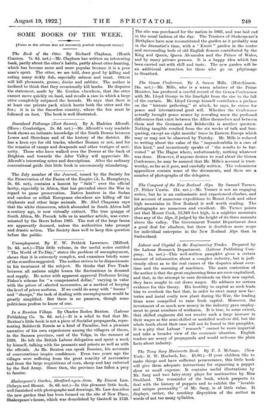Labour and Capital in the Engineering Trades. Prepared by the
Labour Research Department. (Labour Publishing Com- pany. Is. net.)—This well-written pamphlet gives a certain amount of information about a complex industry, but is judi- ciously silent as to the real causes of the disputes about over- time and the manning of machines. The main contention of the author is that the great engineering firms are over-capitalized, and that, in the attempt to earn dividends on their new capital, they have sought to cut down wages. Ho adduces no serious evidence for this theory. His hostility to capital as such leads him to overlook the fact that, in order to erect many new fac- tories and instal costly new plant during the War, the leading firms were compelled to raise fresh capital. Moreover, the investment of so much new money in the industry gave employ- ment to great numbers of workmen. It is true, to some extent, that skilled engineers did not receive such a large increase in their wages as the semi-skilled or unskilled workers did, but the whole truth about their case will not be found in this pamphlet. It is a pity that Labour " research " cannot be more impartial and take a broader view of the economic situation. English readers are weary of propaganda and would welcome the plain facts about industry.


































 Previous page
Previous page